- Home
- Stephanie Laurens
In Pursuit Of Eliza Cynster Page 22
In Pursuit Of Eliza Cynster Read online
Page 22
And he didn’t, in fact, need to follow the pair’s trail directly. If they had quit the road and gone into the hills, he was willing to wager as to where they would come out. Such a direction would confirm his increasingly strong conviction that they were making for the Jedburgh Road, and the border crossing at Carter Bar. From their perspective, there were several advantages in using that crossing, and he’d wager there were others he didn’t know.
Given he was convinced they were heading that way, there was no need for him to climb over the hills in their wake. He could, instead, follow the road northeast to Gorebridge, and use the time to lose Scrope there. There was no need whatever for Scrope to come up with the pair; if, as he suspected, they’d bravely marched into the wilds of the Moorfoots, he would seize the opportunity to rid them all of Scrope.
That accomplished, he would ride south to St. Boswells. A few miles north of Jedburgh on the main Jedburgh road, the town was well known to him and would suit his purposes very well. He would simply wait there until the pair came down the road, then fall in on their heels, close enough to observe and satisfy himself that despite his failure, Eliza Cynster’s future was assured. Simultaneously, he could act as an extra guard for the pair, just in case Scrope continued to follow.
It didn’t take long to make up his mind.
Shaking his reins, he nudged Hercules into a slow walk. He made a show of checking the verges as they rounded the bend. Frowning increasingly blackly, he eventually drew rein level with the farm gate and stared up the road toward Gorebridge. “Surely they didn’t drive on?”
He’d come to see the pair as intelligent; he’d expected them to be courageous enough to leave the gig there and take the physically more demanding route through the hills, understanding that if they drove on, he at least — and Scrope if they knew about him — would catch them up all too soon.
But there were no tracks. None. No boot prints heading toward the hills, no wheel tracks turning in at the farm gate …
He stared at the ground leading to and past the farm gate. It was unmarred by tracks of any sort. Which was simply ridiculous. Indeed, when he peered more closely, the surface looked as if someone had used a pine branch to sweep it even.
He was willing to wager someone had.
“Very clever. In this case, just a tad too clever for your own good, but it’ll serve.” Edging Hercules on once more, he scanned the verge on the opposite side of the road — and found very faint signs of the grass being crushed, just enough to allow for two pairs of boots to have carefully passed that way.
“Excellent.” Straightening, he lifted his reins and sent Hercules into a trot, then a canter.
The pair had gone into the hills, but there was no chance that Scrope would see, let alone correctly interpret, such carefully concealed signs.
Scrope would follow him to Gorebridge and, with any luck, that was the last the three of them — him, Eliza Cynster, and her gentleman — would see of the iniquitous Scrope.
Chapter Ten
he cottage proved to be a shepherd’s hut, presently untenanted, but whoever normally lived there hadn’t been gone long and, quite possibly, given the pots of herbs growing on the windowsill, expected to be back soon.
Eliza followed Jeremy through the wooden door and into the single room. Built of split logs and stone, with a sound thatched roof, the cottage was larger than it had at first appeared; as well as a deal table and chairs, kitchen benches and a tin sink arranged around the single window, and the stone hearth, there were two pallets on rough-hewn wooden frames, one large, one smaller, and three narrow cupboards of different sizes set against two walls. There was even a washstand with a chipped pottery basin and ewer. Glancing around, she noted a general neatness and cleanliness. “Perhaps they’ve gone down to the nearest town for supplies.”
Setting the saddlebags on the table, Jeremy nodded. “Very likely. I wonder if there’s anything we might use for dinner — we can leave payment for anything we take.”
Eliza caught his eye. After a moment, she asked, “Can you cook?”
He blinked slowly, started to shake his head, then stopped. “I’ve never tried, but how hard can it be?”
Coming to the table, she opened the bags and pulled out everything edible they still carried, laying each item on the table. “We’ve bread, fruit, not much cheese. A handful of nuts.” She looked up to see Jeremy poking in the shadows behind the still open door. “What is it?”
Still rummaging, he replied, “I’m not woodsman enough to rig a snare for a rabbit, and I don’t think trying to butcher a sheep or a lamb would be wise — assuming we could even catch one. However”— he emerged, brandishing a long pole wound about with thin twine —“I might just be able to catch us a trout or two.” Meeting her eyes, he grinned. “I heard a stream nearby — I’m going to see what I can manage before the light goes altogether.”
Almost as eager as he, she followed him out of the cottage. He strode across the small clearing before the door, then paused and, with his head, indicated a ring of stones in the center of the space. “Why don’t you see if you can get a fire going — it’ll be easier to cook any fish I might catch out here, rather than on the hearth.”
She nodded. “All right.”
“Tinder’s in the other bag.” He went off through the trees.
She followed as far as the edge of the clearing and saw the stream leaping down the hillside, gushing and splashing over several large rocks before spreading in a wide pool below. The pool was no more than twenty yards from the cottage. “Presumably that’s why the cottage is just here.”
Seeing Jeremy pause by the edge of the pool and fiddle with the end of the twine, presumably attaching a hook, she left him to it — she knew nothing about fishing — and scouted under the nearby trees for firewood.
It was only just May and they were high in the hills; although the evening air was decidedly chilly, it remained dry, and the long twilight was an added bonus. She’d never lit a fire outside by herself, but she finally succeeded in starting a small blaze. By diligently feeding it, she created a passable campfire, then scurried about gathering a pile of branches to keep it going.
Jeremy had still not returned; when she peeked down at the pool, she saw him standing by its edge, silent and still, the pole between his hands gently swaying. There was still light enough to see, and the moon was sailing free in the black sky, etching a silvery edge on every line.
Returning to the fire, she considered the next step. How, exactly, were they to cook a fish? Going into the cottage, she found a candlestick, went back to the fire to light it, then searched through the various cooking implements arranged around the hearth.
She’d just set up the iron spit she’d found — it had taken her a good few minutes to work out which bits went where — when Jeremy appeared, pole in one hand and two nice-sized trout dangling from the other.
Grinning, he paused by the fire, holding up his catch for her to admire.
She dutifully did. “Perfect!” She looked up at him. “What now?”
Setting down his rod, he laid the fish down on the thick grass. “I gutted them down by the stream, so all we need do …” Picking up the long spit, he demonstrated, sliding the thin bar through one fish’s open mouth, then pushing it through and out near the tail. “We’d best do them one at a time.”
Reaching out, he set the rod in the apex of the two tripods she’d set up, one on either side of the fire pit. “There.” Drawing back, he settled on the grass beside her.
Shoulder to shoulder, they watched the fish heat, steam, then start to cook.
Picking up a stick from her pile, Jeremy used it to spread the burning branches more evenly in the pit. “The trick is,” he murmured, “not to try to cook it too fast. We don’t want it charred.”
She nodded. He glanced at her face, saw the smile curving her lips, and felt remarkably content.
After a moment, she stirred and got to her feet. “I’ll get some plates and th
e bread.”
He stayed where he was, his arms loosely draped over his raised knees, his hands lightly clasped, and watched the heat from the flames slowly sizzle the fish’s skin.
When she returned with two tin plates, two plain forks, two tin mugs of water, and her knife, he helped her set their al fresco table and couldn’t remember ever feeling so simply happy, so pleasantly content, in all his life.
Oddly for him, some primitive impulse insisted he didn’t analyze or question; as a scholar he tended to do both instinctively, without fail. But for some reason the man within this time felt no hesitation in yielding to the moment, and simply being.
Simply wallowing.
Some wiser, more fundamental part of him knew that such moments in life were too rare to waste with worrying and poking; they were to be embraced and enjoyed without hesitation, equivocation, or care.
They timed it perfectly, slipping the tin plates under the fish just at the moment it parted from the bone. With soft laughter and cheers at their victory, they paused to set the second fish to cook, then fell on their plates with gusto, with appetites given an edge by the moment, by their surroundings, by their day.
When she licked her fingertips, then, eyes closed as she savored, murmured, “I’ve never tasted fish as wonderful as this,” all he could do was agree.
The fresh spring water tasted as fine as the most coveted wine.
The second fish went the way of the first. Finally replete, they left their plates on the grass and simply sat, shoulder to shoulder, side by side, and stared into the rosy flames.
Eventually, Eliza glanced at Jeremy. “Tell me about your family.” Tell me about you.
He glanced along his shoulder, met her eyes. “You’ve met Leonora.”
She nodded. “But if I recall aright, you live with your uncle, don’t you?”
“Humphrey.” Facing the flames, he went on, “We — Leonora and I — went to live with him when our parents died. I was twelve. Humphrey lived in Kent then, but within a few years, he moved the whole household to London, the better to pursue his research.”
“What does he study?”
“Ancient manuscripts, like me.”
Distracted by the play of the firelight over the austere planes of his face, she searched for her next question. “Do you, and he, specialize in some particular form?”
“Not so much form as language. It used to be Sumerian, and I suppose that’s still our favorite, but we’re both comfortable consulting on any of the hieroglyphic-based scripts.”
“Is there much call for that?”
And so it went on. She gradually built up a picture of what his life was like, how he spent his days; the information that he usually spent a few months every year traveling at the invitation of Europe’s great institutions left her envious.
“It was Prague last year. And there’s talk of a request coming through from Vienna — we’ll see.”
She sighed and asked how he liked the traveling. Bit by bit, question by question, she learned more of a lifestyle significantly different from any she’d known, yet at the same time overlapping her familiar world.
Thinking of that overlap, she fixed him with a direct look. “I can’t recall meeting you at any ball except for that once, long ago. Lady Bethlehem’s, I think it was.”
He pulled a face. “I don’t remember where it was. In those days Leonora insisted on dragging me out, introducing me around. I let her for a year or so, but balls aren’t really my forte.”
She arched a brow. “Not even if the venues have excellent libraries?”
He chuckled, nodded. “I tried that for a while, but Leonora, and others, too, quickly realized where to find me, and so the libraries — and therefore the balls — lost their allure, so to speak.”
She grinned. His revelations had distracted her nicely from the increasing closeness — an intimacy not physical — that the firelight and the darkness and his nearness had engendered. She was congratulating herself on having gained a surprisingly detailed account of his life with very little effort when she caught him looking at her, a far too knowing look in his eyes.
“Your turn,” he said. “I know about your family in general terms, but how do you see them?”
Wrapping her arms about her calves, she laid her chin on her knees and fixed her gaze on the flames. “You know the family well enough to have a sense of our characters, at least in general. My sisters … they’re more … I suppose the word is active, than I am. I’m the quiet one. As you know, I don’t like riding — until today, I didn’t even know I liked walking. I don’t, usually, but I think it might be the weight of the skirts. I’ll have to experiment when I get home — to the Quantocks and Casleigh, I mean. Heather often walks there, and Angelica rides a lot, even more than Heather.”
He tipped his head so he could watch her face. “So what do you do during a country sojourn there?”
She smiled faintly. “I embroider — I actually enjoy it. Aunt Helena is a wonderful needlewoman, and she taught me. I also practice a lot — the harp, mostly. The pianoforte is easy, relatively speaking.” She slanted him a glance, met his eyes. “I’m the one always asked to sing first at those sort of family gatherings.”
He smiled back. “There has to be someone to take on the role.”
She looked back at the flames. “Yes, well — that’s me.”
“But you spend most of your year in London, don’t you?” When she nodded, he continued, “What’s an average day there like — what do you do?”
She hesitated for an instant, but the warmth of the fire, the ease of his company, the simplicity of the moment, swept aside her reservations. Settling more comfortably, she gave herself up to answering his questions — responding to his interrogation — with the same candor he’d offered her.
It was a strangely heady experience; she — and she suspected he, even more — wouldn’t normally have answered such questions. Normally she wouldn’t have been asked such questions, let alone felt free to reply with so little reserve.
It was the circumstance, the situation, the isolation softened by the glow of the fire. She told herself that, and in part it was true, but had he been anyone else, anyone who had been less honest with her … she couldn’t imagine revealing such things, and feeling so at ease as she did.
Gradually the night beyond the fire deepened. His questions ceased, and they simply sat, ineffably at ease with each other.
Nothing needed to be said; she felt no compulsion to make conversation, and he seemed as relaxed as she.
A silent communion enfolded them, imparting comfort and reassurance. Calm, peace, serenity; all were there in the darkness of the night, in the flames slowly dying to glowing embers.
Jeremy wasn’t sure if that soothing blanket was real or imaginary, but he was content to accept it and continue to sit in the quiet with her. Enjoying the night with her.
The silence, the wild emptiness, and by contrast the togetherness.
He appreciated silence — on some level his soul drank it in — but he’d never met a woman, let alone a lady, who was as comfortable with silence as he.
Then again, he’d never had cause to be as close to a lady outside of the customary haunts of society.
He didn’t want to break the stillness, the peace, yet … they would soon need to go inside, and there was one thing he wished to say.
Lifting a stick from the pile, he slowly spread the coals. “Often, in situations such as ours, people — people like us — think too hard.” He glanced briefly her way, saw he had her attention. Transferred his gaze back to the embers. “We invest the moment with meanings it may not necessarily have. We constrain and limit the potential outcomes by imposing external expectations, by imagining and anticipating how others will see things, what they might say … when in reality none of that might matter.”
They were sitting close, her shoulder touching his. Turning his head, he met her gaze.
Her hazel eyes, only inches away, were se
rious, her gaze direct. “What happens, happens?”
“What might happen should be allowed to happen.” He hesitated, then went on, “The wisest people are those who don’t prejudge, who don’t assume they know how matters will play out, especially when there’s more than just themselves involved. The wise let situations play out without wasting energy organizing to battle outcomes that may never eventuate. They let the dice roll, and let them settle before deciding how they should cope with the result.”
For a long moment, she held his gaze, then her lips very faintly curved. “I take it you’d prefer to be wise?”
He nodded. “Perhaps it’s simply the scholar in me, but I can’t see any point in going the other way. The usual way.”
She held his gaze; a long moment ticked by.
He forced himself to remain as he was, his arms, like hers, loosely clasped about his knees. The fading warmth given off by the dying embers seemed to his wayward senses to be replaced, superseded, by the warmth of her, by the alluring temptation of her nearness.
Then she inclined her head. “I agree.” Her eyes remained on his as she freed one hand, raised it. “So let’s roll the dice, and see what comes.”
Her hand touched his cheek, framed, caressed, then, lids lowering, she leaned closer, nearer, and her lips met his.
And she kissed him again, openly, directly, with no possibility of doubt as to her intent.
Lids falling, he savored the contact, so amazingly sweet. He’d kissed women enough over the years, but never had a simple kiss been this addictive. Shackling the fingers of one hand about his other wrist, forcing himself to remain as he was, he kissed her back, then tempted her further.
And she came.
Swiveling up to her knees, Eliza deepened the kiss, instinctively surrendering her mouth, luring him to take. She pressed nearer, her breasts firm against his upper arm, the hard edges of the rose quartz pendant still safely tucked between her breasts impinging on her senses.
Urging her on. She leaned in, with her lips pressing for more … then he moved.

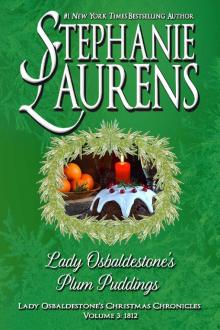 Lady Osbaldestone’s Plum Puddings: Lady Osbaldestone’s Christmas Chronicles Volume 3
Lady Osbaldestone’s Plum Puddings: Lady Osbaldestone’s Christmas Chronicles Volume 3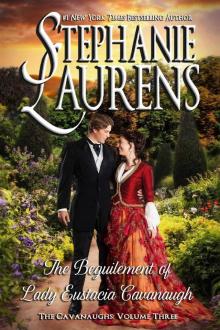 The Beguilement of Lady Eustacia Cavanagh: The Cavanaughs Volume 3
The Beguilement of Lady Eustacia Cavanagh: The Cavanaughs Volume 3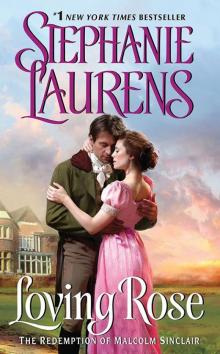 Loving Rose: The Redemption of Malcolm Sinclair (Casebook of Barnaby Adair)
Loving Rose: The Redemption of Malcolm Sinclair (Casebook of Barnaby Adair)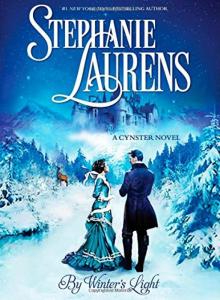 By Winter's Light
By Winter's Light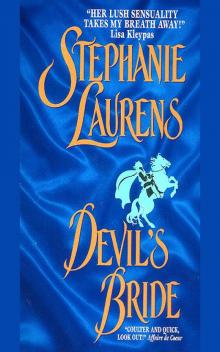 Devil's Bride
Devil's Bride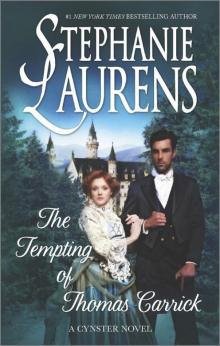 The Tempting of Thomas Carrick
The Tempting of Thomas Carrick![Cynster [22.00] A Match for Marcus Cynster Read online](http://i1.bookreadfree.com/i/03/16/cynster_[22_00]_a_match_for_marcus_cynster_preview.jpg) Cynster [22.00] A Match for Marcus Cynster
Cynster [22.00] A Match for Marcus Cynster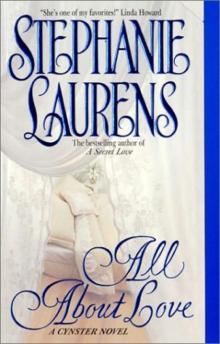 All About Love c-6
All About Love c-6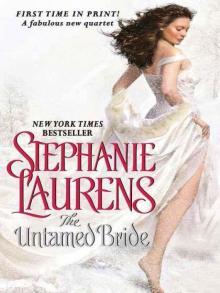 Cobra 01 The Untamed Bride
Cobra 01 The Untamed Bride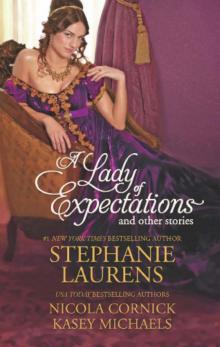 A Lady of Expectations and Other Stories
A Lady of Expectations and Other Stories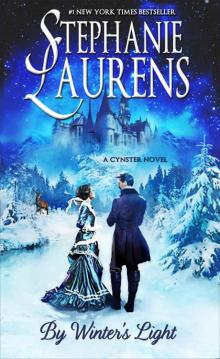 By Winter's Light_A Cynster Novel
By Winter's Light_A Cynster Novel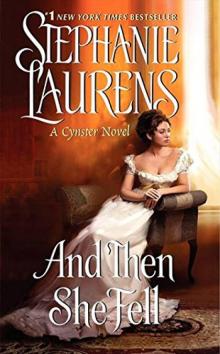 And Then She Fell
And Then She Fell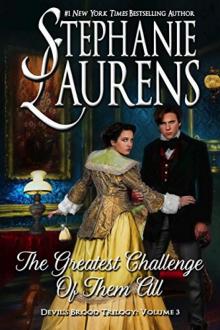 The Greatest Challenge of Them All
The Greatest Challenge of Them All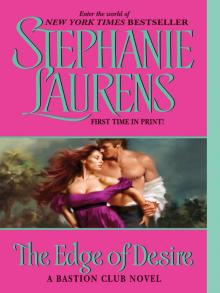 The Edge of Desire
The Edge of Desire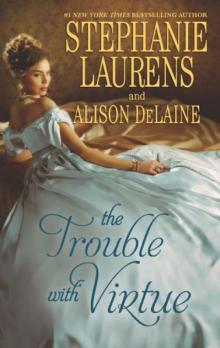 The Trouble With Virtue: A Comfortable WifeA Lady by Day
The Trouble With Virtue: A Comfortable WifeA Lady by Day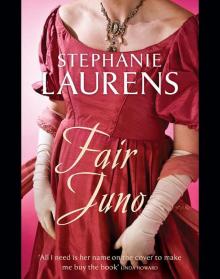 Fair Juno
Fair Juno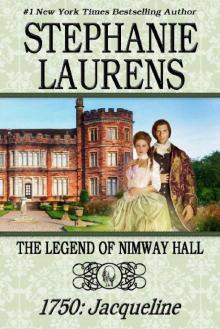 THE LEGEND OF NIMWAY HALL: 1750 - JACQUELINE
THE LEGEND OF NIMWAY HALL: 1750 - JACQUELINE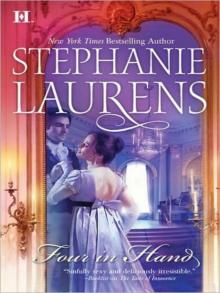 Four In Hand
Four In Hand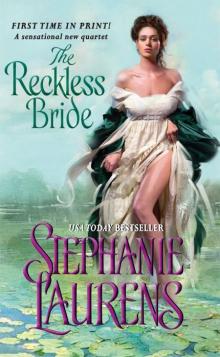 The Reckless Bride
The Reckless Bride Stephanie Laurens Rogues' Reform Bundle
Stephanie Laurens Rogues' Reform Bundle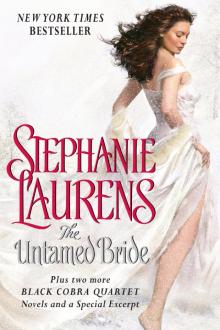 The Untamed Bride Plus Black Cobra 02-03 and Special Excerpt
The Untamed Bride Plus Black Cobra 02-03 and Special Excerpt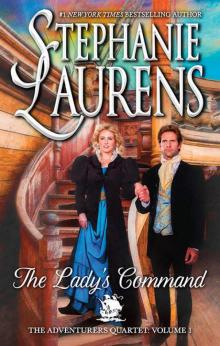 The Lady's Command (Adventurers Quartet #1)
The Lady's Command (Adventurers Quartet #1)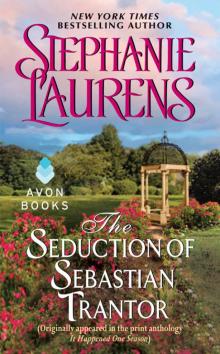 The Seduction of Sebastian Trantor
The Seduction of Sebastian Trantor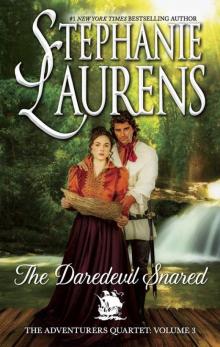 The Daredevil Snared (The Adventurers Quartet Book 3)
The Daredevil Snared (The Adventurers Quartet Book 3)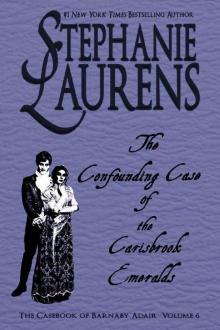 The Confounding Case Of The Carisbrook Emeralds (The Casebook of Barnaby Adair 6)
The Confounding Case Of The Carisbrook Emeralds (The Casebook of Barnaby Adair 6) Lord of the Privateers (The Adventurers Quartet)
Lord of the Privateers (The Adventurers Quartet)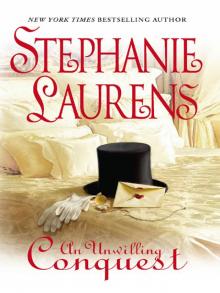 An Unwilling Conquest
An Unwilling Conquest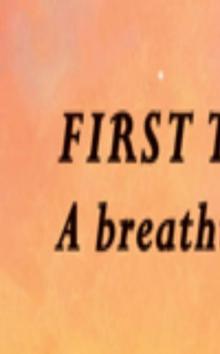 Brazen Bride
Brazen Bride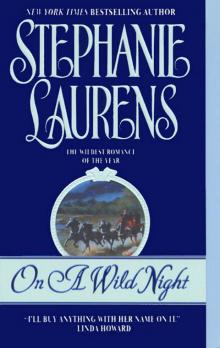 On a Wild Night
On a Wild Night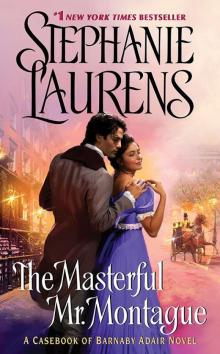 The Masterful Mr. Montague: A Casebook of Barnaby Adair Novel
The Masterful Mr. Montague: A Casebook of Barnaby Adair Novel Lord of the Privateers
Lord of the Privateers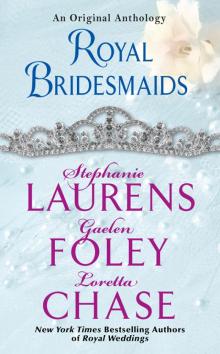 Royal Bridesmaids
Royal Bridesmaids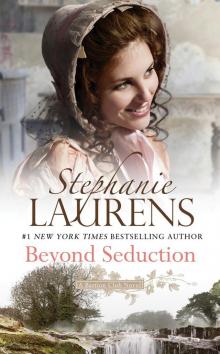 Beyond Seduction
Beyond Seduction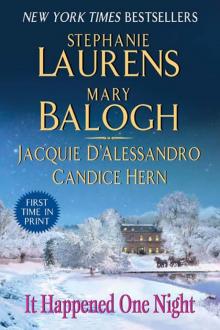 It Happened One Night
It Happened One Night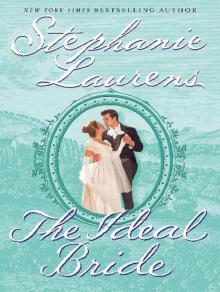 The Ideal Bride
The Ideal Bride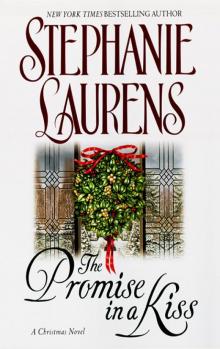 The Promise in a Kiss
The Promise in a Kiss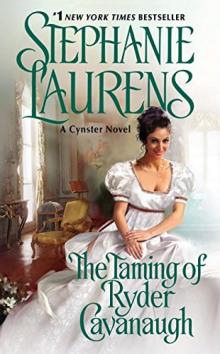 The Taming of Ryder Cavanaugh
The Taming of Ryder Cavanaugh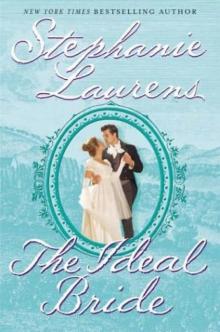 The Ideal Bride c-12
The Ideal Bride c-12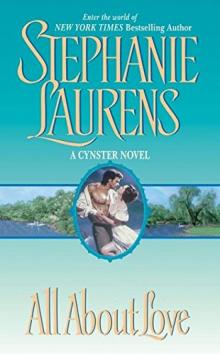 All About Love
All About Love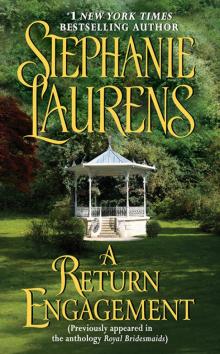 A Return Engagement
A Return Engagement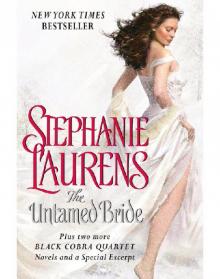 The Untamed Bride Plus Two Full Novels and Bonus Material
The Untamed Bride Plus Two Full Novels and Bonus Material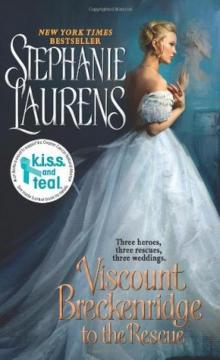 Viscount Breckenridge to the Rescue
Viscount Breckenridge to the Rescue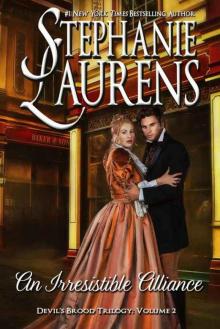 An Irresistible Alliance (Cynsters Next Generation Novels Book 5)
An Irresistible Alliance (Cynsters Next Generation Novels Book 5)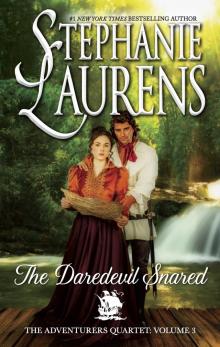 The Daredevil Snared
The Daredevil Snared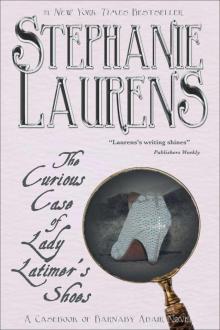 The Curious Case of Lady Latimer's Shoes: A Casebook of Barnaby Adair Novel
The Curious Case of Lady Latimer's Shoes: A Casebook of Barnaby Adair Novel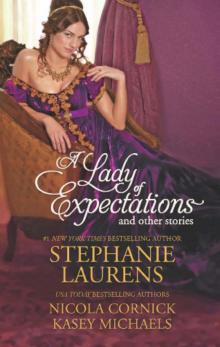 A Lady of Expectations and Other Stories: A Lady of ExpectationsThe Secrets of a CourtesanHow to Woo a Spinster
A Lady of Expectations and Other Stories: A Lady of ExpectationsThe Secrets of a CourtesanHow to Woo a Spinster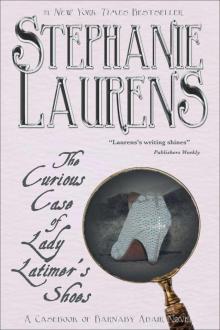 The Curious Case of Lady Latimer's Shoes: A Casebook of Barnaby Adair Novel (The Casebook of Barnaby Adair)
The Curious Case of Lady Latimer's Shoes: A Casebook of Barnaby Adair Novel (The Casebook of Barnaby Adair)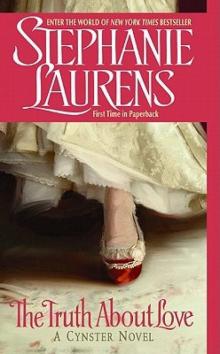 The Truth About Love
The Truth About Love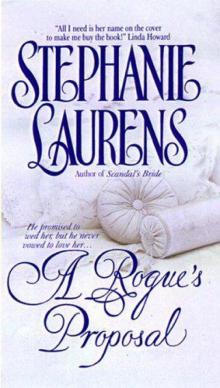 A Rogue's Proposal
A Rogue's Proposal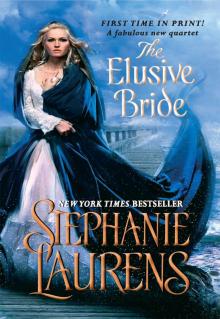 The Elusive Bride
The Elusive Bride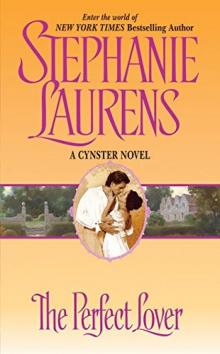 The Perfect Lover
The Perfect Lover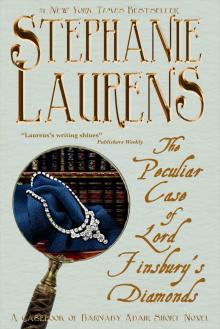 The Peculiar Case of Lord Finsbury's Diamonds: A Casebook of Barnaby Adair Short Novel
The Peculiar Case of Lord Finsbury's Diamonds: A Casebook of Barnaby Adair Short Novel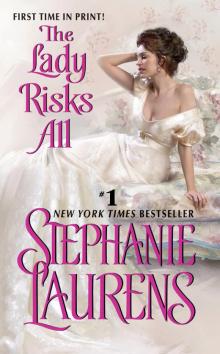 The Lady Risks All
The Lady Risks All The Murder at Mandeville Hall: The Casebook of Barnaby Adair: Volume 7
The Murder at Mandeville Hall: The Casebook of Barnaby Adair: Volume 7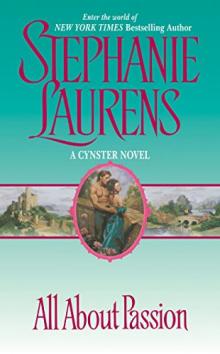 All About Passion
All About Passion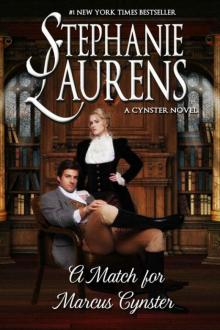 A Match for Marcus Cynster
A Match for Marcus Cynster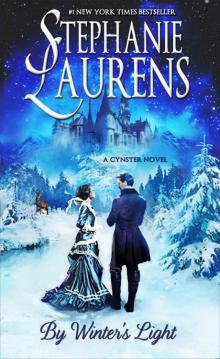 By Winter's Light: A Cynster Novel (Cynster Special Book 2)
By Winter's Light: A Cynster Novel (Cynster Special Book 2)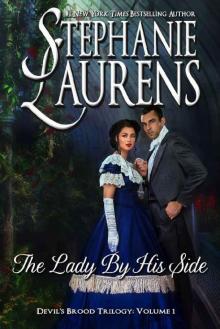 The Lady By His Side
The Lady By His Side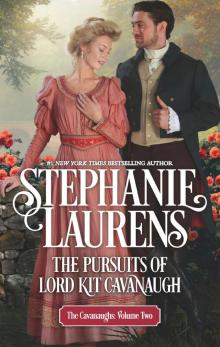 The Pursuits of Lord Kit Cavanaugh
The Pursuits of Lord Kit Cavanaugh Tangled Reins
Tangled Reins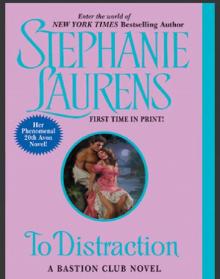 To Distraction
To Distraction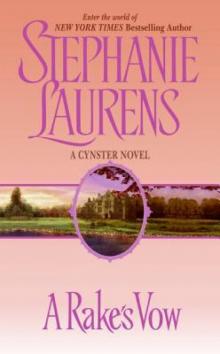 A Rake's Vow
A Rake's Vow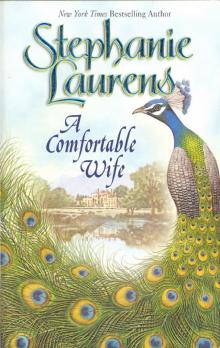 A Comfortable Wife
A Comfortable Wife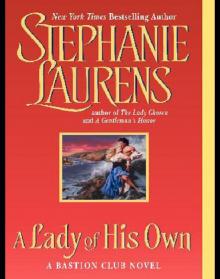 A Lady of His Own bc-3
A Lady of His Own bc-3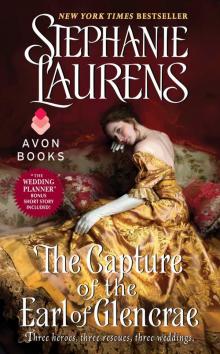 The Capture of the Earl of Glencrae
The Capture of the Earl of Glencrae Scandals Bride c-3
Scandals Bride c-3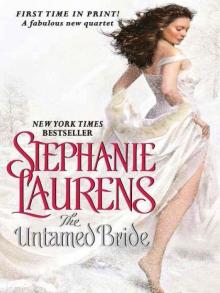 Untamed Bride
Untamed Bride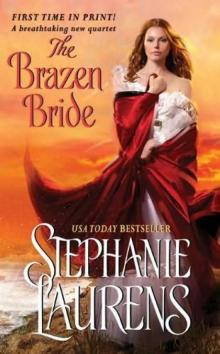 The Brazen Bride
The Brazen Bride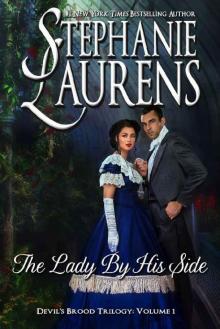 The Lady By His Side (Cynsters Next Generation Novels Book 4)
The Lady By His Side (Cynsters Next Generation Novels Book 4)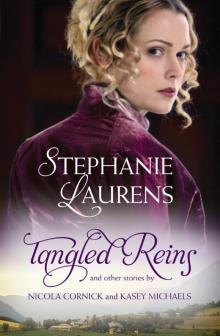 Tangled Reins and Other Stories
Tangled Reins and Other Stories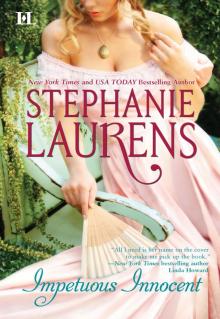 Impetuous Innocent
Impetuous Innocent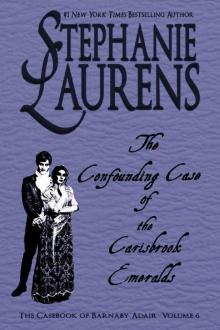 The Confounding Case Of The Carisbrook Emeralds
The Confounding Case Of The Carisbrook Emeralds Stephanie Laurens - B 6 Beyond Seduction
Stephanie Laurens - B 6 Beyond Seduction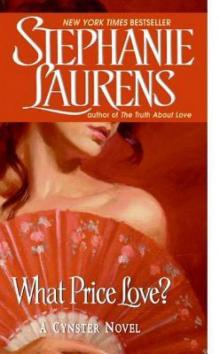 What Price Love?
What Price Love?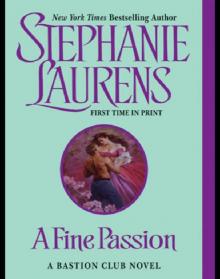 A Fine Passion
A Fine Passion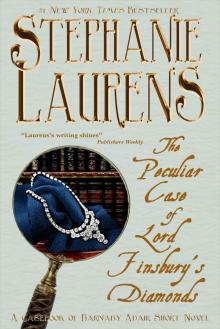 The Peculiar Case of Lord Finsbury's Diamonds: A Casebook of Barnaby Adair Short Novel (The Casebook of Barnaby Adair)
The Peculiar Case of Lord Finsbury's Diamonds: A Casebook of Barnaby Adair Short Novel (The Casebook of Barnaby Adair)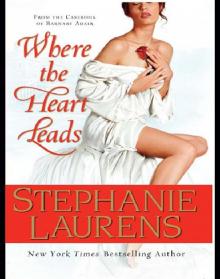 Where the Heart Leads
Where the Heart Leads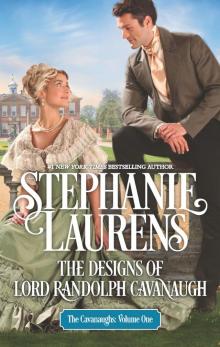 The Designs of Lord Randolph Cavanaugh
The Designs of Lord Randolph Cavanaugh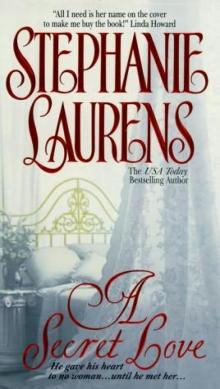 A Secret Love c-5
A Secret Love c-5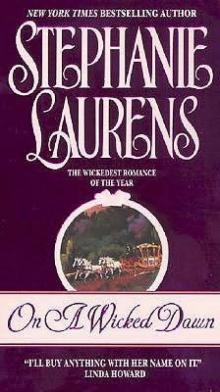 On a Wicked Dawn c-10
On a Wicked Dawn c-10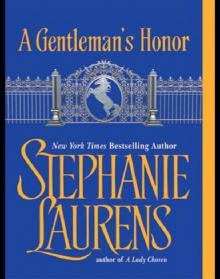 A Gentleman's Honor
A Gentleman's Honor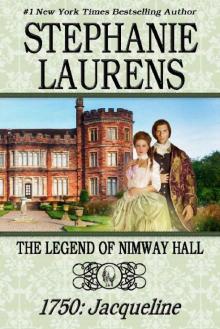 THE LEGEND OF NIMWAY HALL_1750_JACQUELINE
THE LEGEND OF NIMWAY HALL_1750_JACQUELINE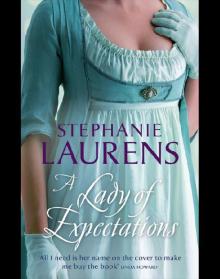 A Lady of Expectations
A Lady of Expectations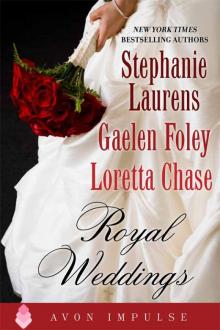 Royal Weddings: An Original Anthology
Royal Weddings: An Original Anthology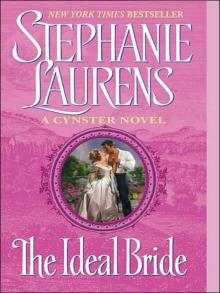 The Ideal Bride (Cynster Novels)
The Ideal Bride (Cynster Novels) Mastered by Love
Mastered by Love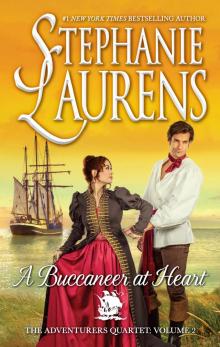 A Buccaneer at Heart
A Buccaneer at Heart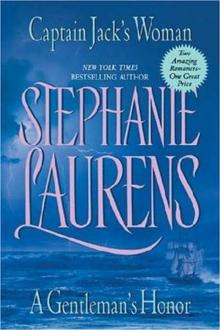 Captain Jack’s Woman / A Gentleman's Honor
Captain Jack’s Woman / A Gentleman's Honor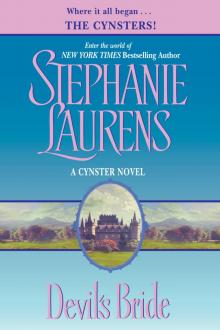 Devil's Bride with Bonus Material
Devil's Bride with Bonus Material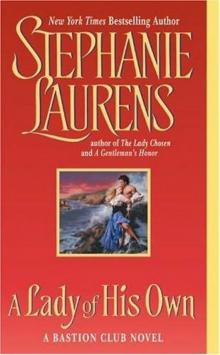 A Lady of His Own
A Lady of His Own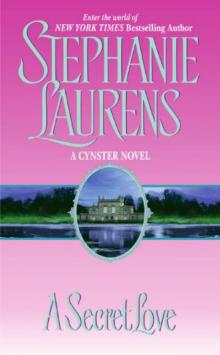 A Secret Love
A Secret Love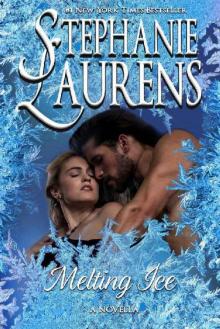 Melting Ice
Melting Ice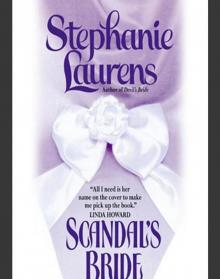 Scandal's Bride
Scandal's Bride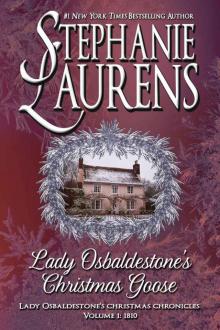 Lady Osbaldestone’s Christmas Goose
Lady Osbaldestone’s Christmas Goose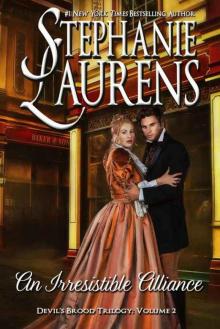 An Irresistible Alliance
An Irresistible Alliance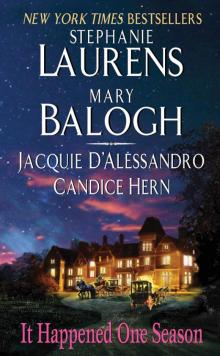 It Happened One Season
It Happened One Season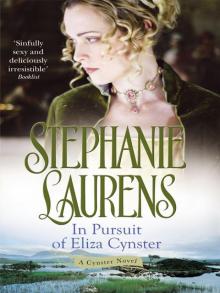 In Pursuit Of Eliza Cynster
In Pursuit Of Eliza Cynster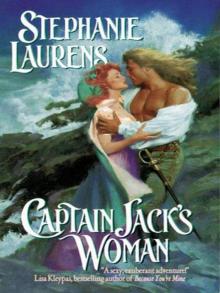 Captain Jack's Woman
Captain Jack's Woman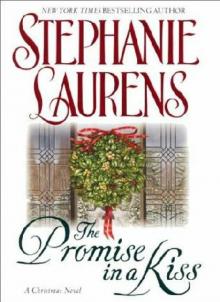 The promise in a kiss c-8
The promise in a kiss c-8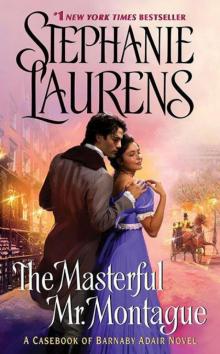 The Masterful Mr. Montague
The Masterful Mr. Montague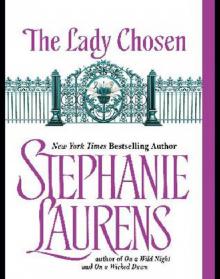 The Lady Chosen
The Lady Chosen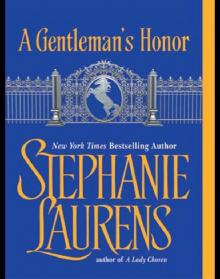 A Gentleman's Honor bc-2
A Gentleman's Honor bc-2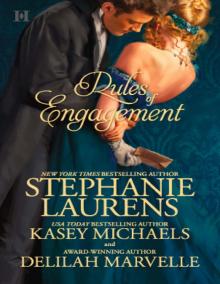 Rules of Engagement: The Reasons for MarriageThe Wedding PartyUnlaced (Lester Family)
Rules of Engagement: The Reasons for MarriageThe Wedding PartyUnlaced (Lester Family) Secrets of a Perfect Night
Secrets of a Perfect Night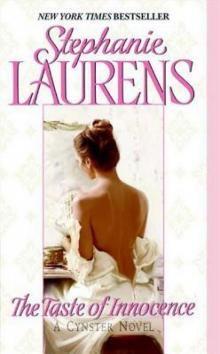 The Taste of Innocence
The Taste of Innocence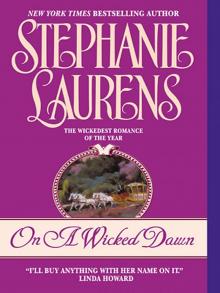 On A Wicked Dawn
On A Wicked Dawn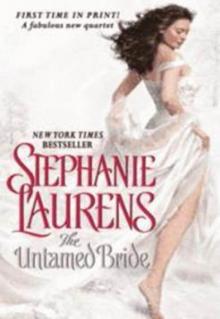 The Untamed Bride
The Untamed Bride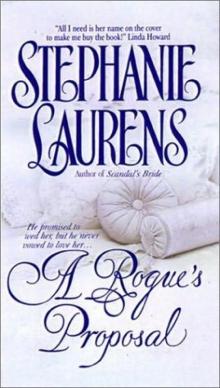 A Rogues Proposal c-4
A Rogues Proposal c-4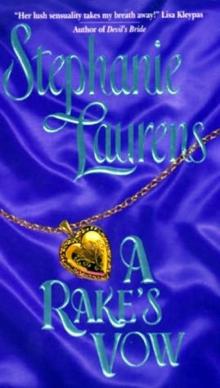 Rakes Vow c-2
Rakes Vow c-2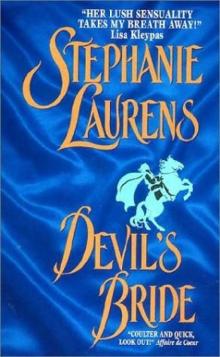 Devils Bride c-1
Devils Bride c-1 Hero, Come Back
Hero, Come Back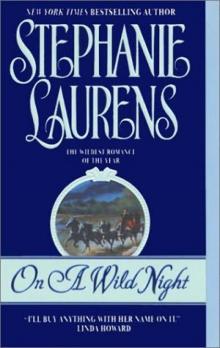 On a Wild Night c-8
On a Wild Night c-8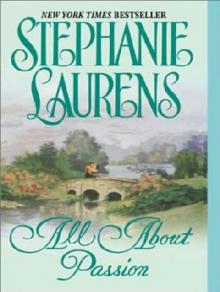 All About Passion c-7
All About Passion c-7